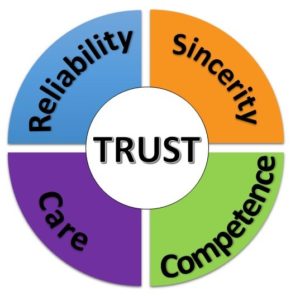Trust at Work - The Foundation of Team Success
Building a Strong, Cohesive Team
(1 day program offered in the classroom or in our virtual classroom)
Overview
Working as a team involves genuine engagement and collaboration with others. In order to achieve that engagement and collaboration you need a foundation of trust before you can begin to build, develop and grow that team.
A team without trust isn't really a team: it's just a group of individuals, working together, often making disappointing progress. They may not share information, they might battle over rights and responsibilities, and they may not cooperate with one another. It doesn't matter how capable or talented your people are, they may never reach their full potential if trust isn't present. When people trust one another, the group can achieve truly meaningful goals.
Learning Objectives
Successful completion of this course will increase your knowledge and ability to:
- Build trust quickly in new situations
- Maintain strong trust over time, even through major challenges
- Repair trust when it becomes damaged
- Create a sustainable culture of trust
Instructional Strategies
This workshop is highly interactive. The instructor presents key concepts, then helps the participants build personal connections through discussions, interactive exercises, and games. Participants receive confidential individual feedback based on a questionnaire that is completed in advance of the course. They complete an action plan for developing their Path to Trust, and are encouraged to reach out to others in the class to provide mutual support for development.
Audience
Path to Trust workshop is designed for:
- Boards and leadership teams
- Project and program teams
- Anyone seeking to strengthen trust with employees, peers, customers, and other key stakeholders
Prerequisites
When working with intact teams we begin with the Path To Trust Team Trust Assessment This assessment rates the level of trust on your team using the four domains of trust model, allowing you to see specifically where to focus learning in order to realize the the greatest benefit.
Content Outline
- Framework for trust
- TRUST vs Distrust
- Brain Science of TRUST
- Four domains of TRUST
- Building TRUST in each domain using case studies
- What to do when Trust has been broken?
- Team Debrief and Action plan (if this is an intact team there is a team assessment)
- Case Study
The Language of Trust
- Introduction to the Four Domains of Trust
Sincerity
- Congruence
- Aligning Words and Actions
- Aligning Words with Words
- Building Trust: Sincerity
Reliability
- Requests, Offers and Commitments
- Building Trust: Reliability
Competence
- You have the capacity, skill, knowledge, resources and time to do the work
- Being competent does not mean being perfect. Part of doing something well is knowing what you don’t know, being willing and open to learn and to ask for help, feedback, direction and suggestions when you need it.
- Building Trust: Competence
Care
- We are in this together, I have your back
- Building Trust: Care
Confronting Distrust
- How You Say it Counts
- Before The Conversation
- Steps to the Conversation
- Example conversations and practice
- Conversations upwards
How to Communicate When Trust Has Been Betrayed
- How to Say it
Trust, Distrust and the Brain
- Good news, the trust distinctions can be learned
Putting into Practice
- The key is practice
Action Planning
- Identifying Development Priorities
- Completing an Action Plan/conversation plan on one trust conversation
- Committing to Next Steps
Customization Options for Your Team
The material and delivery can also be customized to the specific needs of your team.
Trust at Work - The Foundation of Team Success Course Outline (PDF)
